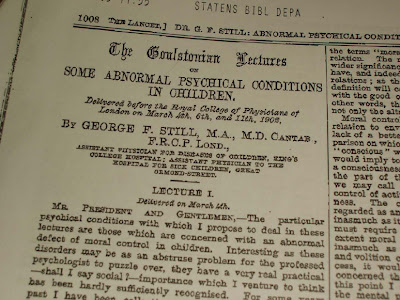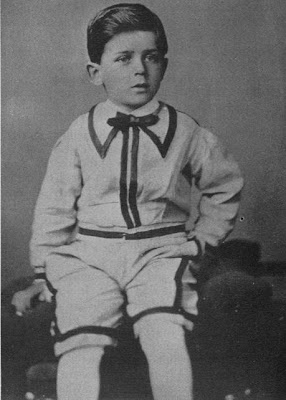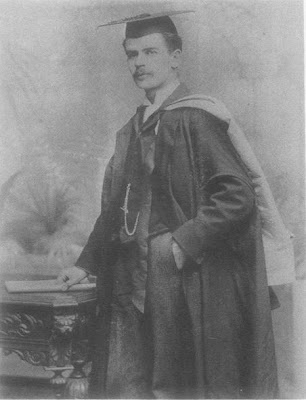
Sir George Frederick Still (1868-1941) The father of British pediatrics.
England’s first professor in child medicine presented on 4th, 6th and 11th March 1902 a series of three lectures to the Royal College of Physicians in London, under the name “Goulstonian lectures” on ‘some abnormal psychical conditions in children’, which were published later the same year in the Lancet. He described 43 children who had serious problems with sustained attention and self-regulation, who were often aggressive, defiant, resistant to discipline, excessively emotional or passionate, who showed little inhibitory volition, had serious problems with sustained attention and could not learn from the consequences of their actions; though their intellect was normal.
He wrote “I would point out that a notable feature in many of these cases of moral defect without general impairment of intellect is a quite abnormal incapacity for sustained attention.
He concluded:“there is a defect of moral consciousness which cannot be accounted for by any fault of environment” When Still was talking about Moral Control, he was referring to it as William James had did before him, but to Still, the moral control of behavior meant “the control of action in conformity with the idea of the good of all”

”Another boy, aged 6 years, with marked moral defect was unable to keep his attention even to a game for more than a very short time, and as might be expected, the failure of attention was very noticeable at school, with the result that in some cases the child was backward in school attainments, although in manner and ordinary conversation he appeared as bright and intelligent as any child could be. These considerations on the nature of the defect may appear to speculative to have any practical value, but I venture to think that they have some basis in clinical fact, and my reason for bringing them forward in this connexion is to emphasise the possibility that other morbid conditions beside defect of moral consciousness may be responsible for defect of moral control.”

George Still certainly did not use the current terminology for this disorder, but many historians of ADHD have inferred that the children he described in his series of three published lectures to the Royal College of Physicians would likely have qualified for the current disorder of ADHD combined type, among other disorders.

George Still as child
The History of British Pediatrics.
George F Still
References:
Alexander Crichton : An inquiry into the nature and origin of mental derangement : comprehending a concise system of the physiology and pathology of the human mind and a history of the passions and their e?ects. 1798.
Some abnormal psychical conditions in children: the Goulstonian lectures”. The Lancet’, 1902;1:1008-1012
Russell A. Barkley: The Relevance of the Still Lectures to Attention Deficit Hyperactivity Disorder A Commentary. 2006; 10; 137 J Atten Disord.
George F. Still Some Abnormal Psychical Conditions in Children: Excerpts From Three Lectures 2006; 10; 126 J Atten Disord.
Palmer, E. D., and Finger, S. 2001. An early description of ADHD(Inattention Subtype): Dr. Alexander Crichton and the ”MentalRestlessness” (1798). Child Psychology and Psychiatry Reviews, 6, 66-73.
Many Thanks to:
Dr. Russell Barkley for material and kind advice.
Stanley Finger at Washington university in St Louis.
Links to Part 1 in the history of ADHD: Alexander Crichton
Links to part 2 in the history of ADHD Sir George Frederick Still

Swedish
ADHD historia Del 1 Alexander Crichton
ADHD historia Del 2 Alexander Crichton
ADHD historia Del 3 Sir George Frederick Still
ADHD historia Del 4 Charles Bradley 1937 – Benzedrine
Copyright by the author, all rights reserved.

six years ago i was diagnosed with adhd. since then and the preceding forty years of my life i have lived a life of constant turmoil with all the features described by alexander crichton and sir georgel still. recently i found a product called l theanine which is an by product of the green tea leaf which produces a calming effect. this has improved my life somewhat as it allows me to relax and sleep more and better. the results are a more relaxed body and mind. unfortunately not all these symptoms are aleviated. but it is much better than the other drugs that i have tried in the past twenty years without much success. after reading the articles of these two men and finding out that they date back two hundred years and with the discovry recently of six report card s from my youth dating from grades one to six the discription by the teachers of my character at these times is a discription of adhd . this was a well know illness during the sixties and for the preceding one hundred and fifty years and till the present time. how is it that knowone doctors teachers law enforcement religious leaders all of whom i came into contact with were so void of any inclination to this illness during my childhood and into adulthood.how is it that was so clearly discribed by my teachers was not picked up by someone . how is it that i was allowed to proceed though school unsuccessfully as i was and then dumped into society to become the person i became. how is it that noone two hundred years after alexander crichton discribed correctly the syptoms of adhd which fit the discribed features in dsm -iv today could miss this. i had every thing height looks atlectic ability presence everything to be succesfull in life but because of this illness and peoples unwillingness to go to the library as i did and find out what this was which had been so clearly defined. what a waste of a life
thanks for this opportunity to say something i ve wanted to say all my life but was never able to before now
Eye low man!
Best ADD ADHD history i ever have read here on this page.
Thanks ;)